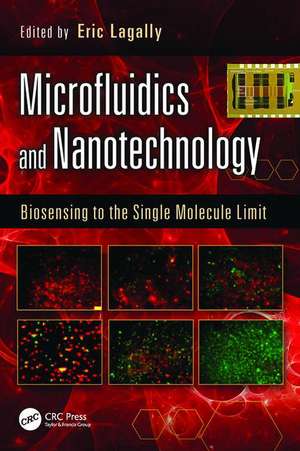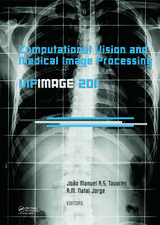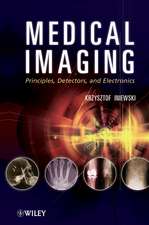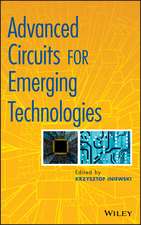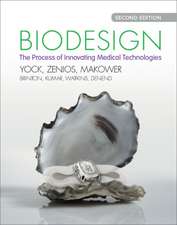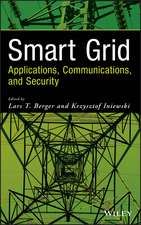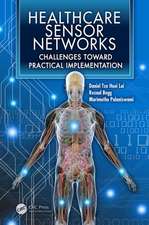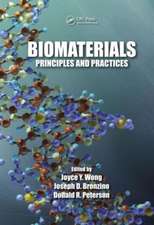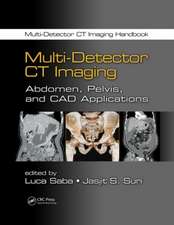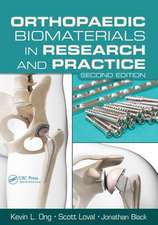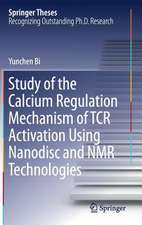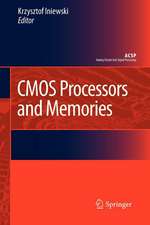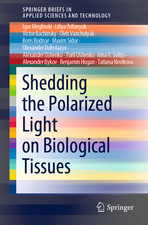Microfluidics and Nanotechnology: Biosensing to the Single Molecule Limit: Devices, Circuits, and Systems
Editat de Eric Lagallyen Limba Engleză Paperback – 29 mar 2017
Microfluidics and Nanotechnology: Biosensing to the Single Molecule Limit details proven approaches for the detection of single cells and even single molecules—approaches employed by the world’s foremost microfluidics and nanotechnology laboratories. While similar books concentrate only on microfluidics or nanotechnology, this book focuses on the combination of soft materials (elastomers and other polymers) with hard materials (semiconductors, metals, and glass) to form integrated detection systems for biological and chemical targets. It explores physical and chemical—as well as contact and noncontact—detection methods, using case studies to demonstrate system capabilities. Presenting a snapshot of the current state of the art, the text:
- Explains the theory behind different detection techniques, from mechanical resonators for detecting cell density to fiber-optic methods for detecting DNA hybridization, and beyond
- Examines microfluidic advances, including droplet microfluidics, digital microfluidics for manipulating droplets on the microscale, and more
- Highlights an array of technologies to allow for a comparison of the fundamental advantages and challenges of each, as well as an appreciation of the power of leveraging scalability and integration to achieve sensitivity at low cost
| Toate formatele și edițiile | Preț | Express |
|---|---|---|
| Paperback (1) | 700.75 lei 6-8 săpt. | |
| CRC Press – 29 mar 2017 | 700.75 lei 6-8 săpt. | |
| Hardback (1) | 1406.48 lei 6-8 săpt. | |
| CRC Press – 27 mai 2014 | 1406.48 lei 6-8 săpt. |
Din seria Devices, Circuits, and Systems
- 8%
 Preț: 390.20 lei
Preț: 390.20 lei - 8%
 Preț: 542.61 lei
Preț: 542.61 lei - 8%
 Preț: 404.83 lei
Preț: 404.83 lei - 29%
 Preț: 1019.63 lei
Preț: 1019.63 lei - 30%
 Preț: 889.43 lei
Preț: 889.43 lei - 20%
 Preț: 1165.92 lei
Preț: 1165.92 lei - 26%
 Preț: 456.63 lei
Preț: 456.63 lei - 30%
 Preț: 878.42 lei
Preț: 878.42 lei - 18%
 Preț: 1552.73 lei
Preț: 1552.73 lei - 28%
 Preț: 1307.37 lei
Preț: 1307.37 lei - 30%
 Preț: 850.59 lei
Preț: 850.59 lei - 18%
 Preț: 751.07 lei
Preț: 751.07 lei - 29%
 Preț: 1097.55 lei
Preț: 1097.55 lei - 27%
 Preț: 427.84 lei
Preț: 427.84 lei - 27%
 Preț: 429.30 lei
Preț: 429.30 lei - 18%
 Preț: 1118.65 lei
Preț: 1118.65 lei - 26%
 Preț: 1406.48 lei
Preț: 1406.48 lei - 31%
 Preț: 681.15 lei
Preț: 681.15 lei - 30%
 Preț: 851.82 lei
Preț: 851.82 lei - 18%
 Preț: 1391.72 lei
Preț: 1391.72 lei - 26%
 Preț: 456.63 lei
Preț: 456.63 lei - 27%
 Preț: 456.63 lei
Preț: 456.63 lei - 34%
 Preț: 391.84 lei
Preț: 391.84 lei - 29%
 Preț: 1107.18 lei
Preț: 1107.18 lei - 25%
 Preț: 524.78 lei
Preț: 524.78 lei - 30%
 Preț: 769.51 lei
Preț: 769.51 lei - 31%
 Preț: 408.36 lei
Preț: 408.36 lei - 30%
 Preț: 848.98 lei
Preț: 848.98 lei - 18%
 Preț: 846.43 lei
Preț: 846.43 lei - 22%
 Preț: 415.43 lei
Preț: 415.43 lei - 30%
 Preț: 857.50 lei
Preț: 857.50 lei - 31%
 Preț: 1088.40 lei
Preț: 1088.40 lei - 31%
 Preț: 838.82 lei
Preț: 838.82 lei - 30%
 Preț: 828.89 lei
Preț: 828.89 lei - 25%
 Preț: 884.86 lei
Preț: 884.86 lei - 35%
 Preț: 489.62 lei
Preț: 489.62 lei - 23%
 Preț: 456.63 lei
Preț: 456.63 lei - 26%
 Preț: 821.13 lei
Preț: 821.13 lei - 25%
 Preț: 496.94 lei
Preț: 496.94 lei - 28%
 Preț: 881.69 lei
Preț: 881.69 lei - 29%
 Preț: 1100.66 lei
Preț: 1100.66 lei
Preț: 700.75 lei
Preț vechi: 854.57 lei
-18% Nou
Puncte Express: 1051
Preț estimativ în valută:
134.08€ • 140.01$ • 110.72£
134.08€ • 140.01$ • 110.72£
Carte tipărită la comandă
Livrare economică 15-29 aprilie
Preluare comenzi: 021 569.72.76
Specificații
ISBN-13: 9781138072398
ISBN-10: 1138072397
Pagini: 290
Ilustrații: 48; 18 Tables, black and white; 170 Illustrations, black and white
Dimensiuni: 156 x 234 x 15 mm
Greutate: 0.45 kg
Ediția:1
Editura: CRC Press
Colecția CRC Press
Seria Devices, Circuits, and Systems
Locul publicării:Boca Raton, United States
ISBN-10: 1138072397
Pagini: 290
Ilustrații: 48; 18 Tables, black and white; 170 Illustrations, black and white
Dimensiuni: 156 x 234 x 15 mm
Greutate: 0.45 kg
Ediția:1
Editura: CRC Press
Colecția CRC Press
Seria Devices, Circuits, and Systems
Locul publicării:Boca Raton, United States
Cuprins
Toward Unsupervised Smart Chemical Sensor Arrays. Active CMOS Biochip for Electrochemical DNA Assays. Label-Free DNA Sensor Based on a Surface Long-Period Grating. Measuring the Physical Properties of Cells. Technologies for Low-Cost, Hall Effect-Based Magnetic Immunosensors. Two-Dimensional Paper Networks for Automated Multistep Processes in Point-of-Care Diagnostics. Droplet-Based Digital Microfluidics for Single-Cell Genetic Analysis. Droplet-Based Microfluidics for Biological Sample Preparation and Analysis. A Review of Tubeless Microfluidic Devices.
Recenzii
The book Microfluidics and Nanotechnology: Biosensing to the Single Molecule Limit, edited by Eric Lagally, offers a unique collection of detection technologies and fluidic strategies that provides inspiration for improved integration of such fields. This text provides a timely comparison of complementary advancements in biosensors and microfluidics, with state-ofthe- art developments reviewed by renowned experts.
This book represents an important contribution to the fields of microfluidics, biosensing, and single-cell analysis. The level of detail is appropriate for scientists and PhD students interested in using microfluidics for biosensing or cellular applications—perhaps in the format of a special-topics graduate course. Due to its unique yet complementary arrangement, the text provides an important perspective to all readers, but particularly for those interested in developing a new program. In this way, this book can serve as an inspiration piece for more junior scientists thinking of starting their own research group.
With its creative combination of complementary detection and fluidic technologies, this book should prove to be a timely resource for scientists looking to make an impact in biological research using novel tools such as those described within its pages.
—Springer-Verlag GmbH Germany, part of Springer Nature 2018
This book represents an important contribution to the fields of microfluidics, biosensing, and single-cell analysis. The level of detail is appropriate for scientists and PhD students interested in using microfluidics for biosensing or cellular applications—perhaps in the format of a special-topics graduate course. Due to its unique yet complementary arrangement, the text provides an important perspective to all readers, but particularly for those interested in developing a new program. In this way, this book can serve as an inspiration piece for more junior scientists thinking of starting their own research group.
With its creative combination of complementary detection and fluidic technologies, this book should prove to be a timely resource for scientists looking to make an impact in biological research using novel tools such as those described within its pages.
—Springer-Verlag GmbH Germany, part of Springer Nature 2018
Notă biografică
Dr. Eric T. Lagally holds a Ph.D from the University of California (UC)-Berkeley/UC-San Francisco Graduate Program in Bioengineering, USA. Currently, he is a faculty member at Western Governors University, Salt Lake City, Utah, USA. Previously, he founded and consulted for Lagally Consulting, and served as assistant professor at the University of British Columbia, Vancouver, Canada, where his research program was responsible for developing multiplexed surface plasmon resonance microfluidics as well as dielectrophoresis chips for whole-cell detection of Mycobacterium tuberculosis. A co-inventor on patents for microfluidic valve technologies and aptamer selection techniques, he has published numerous peer-reviewed, conference-proceeding, and review papers and chapters in edited books.
Dr. Krzysztof (Kris) Iniewski is managing R&D at Redlen Technologies Inc., Vancouver, British Columbia, Canada, a leading manufacturer of high resolution cadmium zinc telluride semiconductor radiation detectors. He is also president of CMOS Emerging Technologies Research Inc., Coquitlam, British Columbia, Canada, an organization hosting high-tech events on communications, microsystems, optoelectronics, and sensors. A popular speaker and consultant, he has published over 100 research papers, written and edited several books, and held faculty and management positions at University of Toronto, Ontario, Canada; University of Alberta, Edmonton, Canada; Simon Fraser University, Burnaby, British Columbia, Canada; and PMC-Sierra Inc., Burnaby, British Columbia, Canada.
Dr. Krzysztof (Kris) Iniewski is managing R&D at Redlen Technologies Inc., Vancouver, British Columbia, Canada, a leading manufacturer of high resolution cadmium zinc telluride semiconductor radiation detectors. He is also president of CMOS Emerging Technologies Research Inc., Coquitlam, British Columbia, Canada, an organization hosting high-tech events on communications, microsystems, optoelectronics, and sensors. A popular speaker and consultant, he has published over 100 research papers, written and edited several books, and held faculty and management positions at University of Toronto, Ontario, Canada; University of Alberta, Edmonton, Canada; Simon Fraser University, Burnaby, British Columbia, Canada; and PMC-Sierra Inc., Burnaby, British Columbia, Canada.
Descriere
While similar books concentrate only on microfluidics or nanotechnology, this book describes integrated approaches for the detection of single cells and molecules. Focusing exclusively on biological and chemical targets, it explores state-of-the-art physical, chemical, contact, and noncontact detection methods, explaining the theory behind the different techniques. By highlighting a variety of technologies, the text allows for a comparison of the fundamental advantages and challenges of each, as well as an appreciation of the power of leveraging scalability and integration to achieve sensitivity at low cost.
